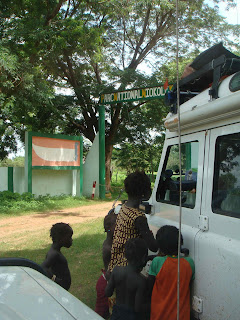 |
| Part of the mountain range |
 |
| Nomad tent |
 |
| Nomadic herd |
So, here we are on the plains of Timbuktu but they did not get ate by a Cassowari, coat, hat and hymnbook too! They trundled on this bad dirt road for a bit again getting tired and hot. But the river was near and they would know then if they can cross that day or camp in the bush.
 |
| River crossing |
There they found people waiting patiently, saying that the ‘bac’ will be back in an hour. And all the men (drivers) started discussing cars and which one is most appropriate for this climate, the type of land and for the work to be done. They inspected the engines. Coen even got tea from them.
Hey, true enough, the barge did appear. It was full of people and vehicles but the guys assured them that all our 3 cars would cross that day. When the vessel beached (there is no port here) the vehicles drove off, some getting stuck in the sand.
 |
| On the ferry |
They were guided into the town of Timbuktoo by the Director of Handicraft for the region. He took them to the Refuge du Sahara where the manager opened to let the cars in the back of the place. The tent was pitched on a concrete slab and the others parked their cars and settled for the night.
The director/owner of the place pitched up and showed them around. The place is quite empty. They have not seen tourists in months, only a few locals.
After a quick meal of whatever was readily available, a quick shower and they were ready for bed. The night was quiet except for the odd donkey braying and the dog barking. Coen was not comfortable, worrying about the car’s clutch, the brakes and other things.
 |
| Doors of the school |
 |
| Inside (SA) library |
 |
| Timbuktu mosque |
 |
| House of explorer |
 |
| Inside the library |
From the other side of the river it has been noticeable that tourists have been through this place: children have only one word of greeting ‘kado’. They are persistent too. This was not very apparent in the other places they visited in Mali.
There was no way of shaking them off even if they had their own guide. The history of the place is quite fascinating but to see what it has become due to bad governance and neglect is sad.
After Chinguetti, she did not expect Timbuktu to be much better. Bigger yes, the roads are wider, the houses are mostly made of sandstone bricks carried on donkey back from quarries kilometers away, and tend to be longer lasting than those in Chinguetti. Some of their doors and windows are also something to look at.
The car was waiting for them at the other end of the market and they drove back in 40C heat. Everyone was wilting or dehydrated. They discussed what they wanted more from the market and Ibrahim (the guide) said he would get it for them.
He brought the merchandise and a few friends who also make jewelry in the Touareg style. Some more haggling and some more buying, and they were left to spend the afternoon at leisure, under the shade of a tree.
Leaving Timbuktu
They left the campement as early as they could and reached the port a bit after 8 the next morning. Unfortunately there were trucks and buses ahead of them and they did not manage the 2nd ‘bac’ of the day. Then started a long 2 hour wait in the sun.
It seems that most of the children and adults had understood that it would be useless to keep pestering them for something and left them alone in their wait for the barge.
All manner of activities was going on in the village attached to the port. In short, people were just going about their business. The passage to the other bank of the river was also part of the day-to-day business, not a struggle like at Rosso or at Barra.
 |
| Camel plough on Douentza road |
 |
| Camel jockey on the road back |
 |
| Mountain range in the distance |
They found the Campement Dogon and rented a room there while the other 2 cars settled as best they could in the rather muddy parking of the place. That evening Elismé managed to make a cottage pie for dinner. There was air-con in the room and they managed to spend a quiet night.









































